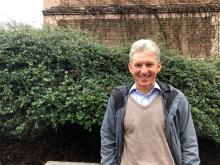By Hunter Kulik
Stephen Meyers was working for a non-governmental organization with landmine survivors in Central America when talk of the Convention on the Rights of Persons with Disabilities (CRPD) began. When the CRPD passed in 2006, Meyers worried that the people who would be the most affected by the CRPD, people with disabilities in developing countries, had no voice in the development of the Convention itself. “What is this Convention going to mean to people around the world?” was the question that largely inspired Meyers to pursue research of disabled persons organizations in Nicaragua.
Meyers’ recent book, Civilizing Disability Society: The Convention on the Rights of Persons with Disabilities Socializing Grassroots Disabled Persons Organizations in Nicaragua (2019), analyzes the disconnect between the wants of grassroots disabled persons organizations and the aims of the United Nations Convention on the Rights of Persons with Disabilities.
“I wanted to learn from people with disabilities in the place furthest from the spotlight,” Meyers says. He spent six summers and a full year in a city of 100,000 in the mountains of Nicaragua. There he worked alongside seven different disability associations, ranging from an association of the Deaf, to an organization of disabled Sandinista veterans, to an association of parents with children with disabilities. He found that while some of the associations were accepting of the CRPD, others rejected it, a major dilemma discussed in Civilizing Disability Society.
Meyers explains that the disabled persons organizations he worked with frequently preferred to focus on social support programs rather than advise government and advocate for legal rights, as the CRPD necessitates. He highlights the importance of cultural differences in understanding this point of contention. “In Nicaragua there is a culture of solidarity which celebrates that good citizens help one another, and this dictates how they understand what organizations should be doing. This contradicts our ideas of citizenship, however, which more implicates a person claiming their rights.”
Civilizing Disability Society shows how good intentions do not always yield positive consequences, especially as it concerns the Global North’s influence on the Global South. Meyers’ work emphasizes that “if you are writing a law about somebody then the people most affected by it should have a say in it, but this also shows the way in which local civic cultures and conditions are misunderstood.”
In reflecting on the process of writing the book, Meyers acknowledged that it was the people in the disability associations who were most effective in articulating the problems they face. Creating a space to talk with and understand associations’ perspectives is the key to reevaluating and making a difference, according to Meyers.
Meyers is devoted to dismantling misconceptions about persons with disabilities, particularly those living in the Global South. In future projects, Meyers plans to research older persons organizations. As the conversation on the Convention on the Rights of Older Persons develops, he hopes to explore the options for older persons in the Global South and to give them a voice.
Furthermore, Meyers is currently writing a new book called What Is Global Disability Studies? which is intended to encourage scholars to rethink the assumptions that are made when working with persons with disabilities outside of the Western World. If anything, he challenges readers to think about the power of listening to people with disabilities rather than making assumptions about what they want.
